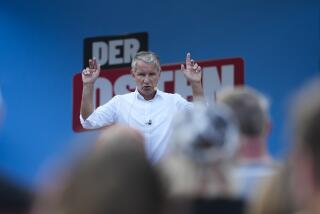Extremist’s Strong Showing Shakes Up Latvian Vote : Baltics: Leader of right-wing party has been convicted of racial hatred in his native Germany.
- Share via
TALLINN, Estonia — An extremist convicted of inciting racial hatred in his native Germany shook up the political Establishment in Latvia’s parliamentary elections by leading his right-wing party to a finish near the top, returns showed Monday.
Joachim Siegerist, who only in recent years claimed Latvian citizenship and doesn’t speak his adopted country’s language, ran a populist campaign that played on Latvians’ fears of the sizable ethnic Russian minority.
Near-complete returns showed his People’s Movement for Latvia running just 2,600 votes behind Saimnieks, a party dominated by leaders from the country’s Soviet past, with each getting about 15% of Sunday’s vote. The ruling Latvian Way Union, a party of free-market reformers, was third, a percentage point behind.
Under a complex formula for apportioning the Parliament’s 100 seats, Saimnieks is expected to get 18 seats, Latvian Way Union 17 and Siegerist’s party 16.
The close finish points to weeks of bargaining to form a new government in the Baltic nation, which lies on Russia’s northwest shoulder and seeks along with its equally tiny former Soviet neighbors, Estonia and Lithuania, to join the European Union and North Atlantic Treaty Organization.
Although political analysts doubt Siegerist will play a role in the new leadership, his party’s strong showing appears to threaten Latvia’s European aspirations by challenging its reputation in the West for moderate, peaceful politics.
It has already caused jitters in Moscow, ever sensitive to discrimination against ethnic Russians in the Baltics.
“This is a clear sign that Latvia is moving toward an erroneous and dangerous form of nationalism,” said Viktor I. Borisyuk, a political analyst for Russian President Boris N. Yeltsin. “I hope other European nations will react soon. They have had enough nationalism and fascism in this century.”
Ethnic Russians, immigrants during half a century of Soviet rule, make up 45% of Latvia’s 2.5 million inhabitants, but only 300,000 are citizens. What’s more, just 294 have managed to obtain citizenship under language and loyalty-oath requirements imposed after Latvia regained independence in 1991.
Campaigning in German with a Latvian interpreter, Siegerist led one of the few parties advocating even stricter citizenship limits. Warning that Communists could return to power and ethnic Russians could outnumber Latvians, he adopted the slogan “Russians to Russia and Latvia for Latvians.”
Posters in Riga, Latvia’s picturesque seaside capital, featured the dark-haired German alongside a picture of the late Soviet dictator Josef Stalin and the message: “A choice between one and the other.”
Born 48 years ago in a German village near the Dutch border, Siegerist claimed Latvian citizenship through an estranged Latvian father who had served in the German army.
He leads a group called German Conservatives in Hamburg and was convicted there last year of publishing hate literature against Gypsies. He was sentenced to 18 months in prison but remains free while his conviction is under appeal.
In 1991, Siegerist joined the center-right Latvian National Independence Movement and, after giving away bananas in the campaign, was elected to Parliament two years ago. He formed his own, more radical party and was later ousted from Parliament for poor attendance and poor command of the language.
Perhaps for that reason, he did not run as a candidate this time but drew votes for his party with a vigorous populist appeal to citizens who feel excluded from the fruits of free-market reform.
While some critics call him “Little Hitler” and a neo-Nazi, his views on most issues are vague. Besides railing against Russians, he spoke out against crime and gave away medicine to the poor, allowing him to garner three times the number of votes predicted by pollsters.
His success follows a pattern in other former Soviet republics, where extremist and zany politicians often score upsets. Siegerist is often compared to the Russian neo-fascist Vladimir V. Zhirinovsky, who might be a kindred spirit were it not for Siegerist’s anti-Russian politics. On Monday, Zhirinovsky’s spokesman dismissed the Latvian results as “an outrage.”
Latvia’s other main parties have also shunned Siegerist as too weird, erratic and extreme to ally with. Analysts say the main players in bargaining over the next government are likely to be Saimnieks, the Latvian Way Union and a group of small center-right parties that together won 30% of the vote.
More to Read
Sign up for Essential California
The most important California stories and recommendations in your inbox every morning.
You may occasionally receive promotional content from the Los Angeles Times.












